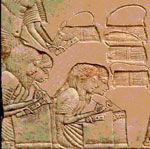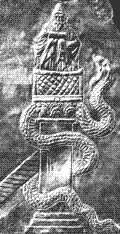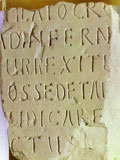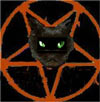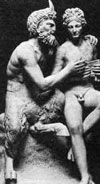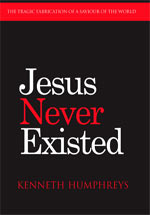"We Don't Need No Education"
"In the person whose mind is sound there is no need for letters."
St Anthony – Christian fanatic from the Egyptian desert – rejects education.
Better Days
Kids at school in pre-Christian Egypt
A bit of a Slap?
"per molestias eruditio" ("true education begins with physical abuse")
– St Augustine (Cahill, p65)
No Choice
"Heresy is named in the Greek from its meaning of choice, since each at his own will chooses what he pleases to teach or believe.
But we are not permitted to believe anything of our own will, nor to choose what someone has believed of his.
We have God's apostles as authorities ... And so, even if an angel from heaven shall preach otherwise, he shall be called anathema."
– Isidore of Seville, 6th/7th century Church Father, Bishop and Saint. (Etymologies – On heresy Chapter 3)
Inmates Running the Asylum
Up the Pole – Simeon Stylites (390-459)
Simeon left a monastery near Antioch to live on a 6' pillar. He moved on to ever-higher structures, until eventually he took up residence on a 60' column.
He supposedly spent 30 years on top this pillar – fed by his adoring fans. His groupies collected offerings and sold his excrement.
Simeon impressed the slightly less insane with the 'piety of suffering.'
"Twice daily Simeon would interrupt his prayer to listen to individuals or to address the crowds. He pronounced on problems of orthodoxy and heresy and his opinions were sought at the ecumenical councils of Ephesus and Chalcedon. Empress, elites and peasants alike wanted his advice, prophecies and judgments,"
– Kevin Butcher, Roman Syria, p392,
The pillars of the stylites – yes, Simon's antics inspired other nutters – may have influenced the minarets of Islam.
Bird Brained superstars
"Some ascetics became boskoi, 'grazers', living in the open without proper clothing, eating grass, nuts, berries and roots, like animals.
Others loaded themselves with heavy chains. The Mesopotamian 'dendrite' David perched like a bird in a tree at Thessalonica in Greece.
The unusual behaviour could lead to iconic, superstar status."
– Kevin Butcher, Roman Syria, p392,
"Important Discoveries in Theology ..."!
447: Council of Toledo ratifies Devil as "a large black monstrous apparition with horns on his head, cloven hoofs ... an immense phallus and sulphurous smell".
Council Edict from Toledo, Visigothic Spain
The Reign of Ignorance
“Scripture gives no false information.”
– St Augustine
Lets see:
• speaking serpent?
• woman made of rib?
• worldwide flood covering mountain tops?
• Methuselah living 969 years?
• Israelite population going from 70 to several million in 400 years? Suggests an awful lot of fornication ...!
• Sun standing still so Joshua can get all his killing done before night fall?
• Samson ripping a lion apart?
• Goliath 10 feet tall?
• Amalekites "utterly destroyed" three times?
• Giants, unicorns, dragons and satyrs?
• Devils cast out of men and into pigs?– and that's just for starters!
Iconoclasm ...
The god Min gets an adjustment
 |
 |
Before ... and After Christ!
Wisdom Shall Perish
"Therefore, behold, I will proceed to do a marvellous work among this people, even a marvellous work and a wonder : for the wisdom of their wise men shall perish, and the understanding of their prudent men shall be hid."
– Isaiah, 29:14
Last of the Line
Flavius Cassiodorus (490-585) praetorian prefect in Italy during the quasi-Roman reign of Theodoric.A classically educated rhetorician, Cassiodorus pleaded the cause of the Gothic kingdom for 30 years (Chronica, Variae).
Despairing of the ruin of Italy by Justinian, Cassiodorus withdrew into 'religious reflection'.His 'school of Christian studies' at Rome was a short-lived failure, and a 'monastery' (Vivarium) – inspired by the Nestorian seminary at Nisibis – on his family estates at Squillace on the Ionian Sea scarcely survived his death.
No Books Needed
"You will find more in forests than in books. Woods and stones will teach you more than any master."
– St. Bernard of Clairvaux – Inspiration behind the Second Crusade (1090-1153).
Devil in disguise?
The glowing eyes and nocturnal behaviour of the cat were interpreted by the medieval Church as clear proof of the hapless moggy's diabolic affinity.
Wholesale destruction of cats hastened the spread of plague-carrying rats.
Christianity grew in a world noted for its intellectual speculation. The pagan empire of Rome – with its great cities, its roads, the peace protected by its legions, made many things possible, including Christianity – a 'Divine Providence' the Church Fathers were pleased to acknowledge. The arts, philosophy, law, science and technology – all attained remarkable levels of development, thanks to the Pax Romana and its vibrant Hellenic culture. But the same fertile environment also favoured the proliferation of 'magic and mysteries' – charlatanism, cults, sooth-saying and nonsense. The very richness of this cosmopolitan world, which enthusiastically assimilated so many diverse cultures, meant that even a movement known by the general rubric of 'Christianity' – to the disgust of the intolerant St Augustine – emerged as 'eighty three heresies'. Sadly, each rival variant held itself to be the one 'truth'.
St Paul's Celebration of Ignorance
Constantine Imposes 'Truth' Part of the tragedy for humanity was that the disingenuous Constantine thought that he could impose a single 'truth' or 'Faith' on the empire in the same manner that he could impose a tax law. For
a century after Constantine's revolution, the 'battle of ideas'
was waged yet secular tolerance ultimately could
be no match to a fanatical intolerance.
In the Brave New World of the Christian empire, in which scientific rationalism was to be condemned as demonic, Constantine's despotism and Lactantius's sycophantic lies were indeed 'model' for what was to come.
Under the influence of a fanatic from Alexandria, Bishop Athanasius, Constantine's youngest son Constans I (337-350) extended state-sanctioned intolerance by banning pagan sacrifice in Italy and waging a campaign against the Donatists in Africa. It ignited a civil war which would wreck the prosperity of Rome's North African provinces. The Donatist doctrines were declared illegal. Their crime? – resisting the centralising authoritarianism of Catholicism. Proscribed in 405 and again in 411 they remained a subversive 'true church' until the 7th century arrival of Islam, even spinning off an armed resistance movement – the Circumcellions. "What has the Emperor to do with the Church?" asked the doomed Donatus. Meanwhile, in the east, Constantius II, a fool terrified of sorcery and manipulated by a succession of rival bishops – Eusebius, Macedonius, Ursacius – waged a campaign against 'soothsayers and Hellenists'. In the 340s the banishment of pagan intellectuals began, followed by the first burning of books of 'magic.' In 353 Constantius ordered the closure of 'heathen' temples and made pagan sacrifice a capital offence. Close by the abandoned temples workshops were established to reduce the holy architecture of the pagans to lime. In gratitude for their destruction of 'idols' Constantius exempted monks from taxation.
Vicious: The Death of Tolerance
Thrown into disarray by Christianity's 4th century civil war (Arian vs. Catholic) and the renaissance of paganism inspired by Emperor Julian, the Catholic theocracy re-established by Emperor Theodosius and Bishop Ambrose was determined to quash any and all opposition.The brief reign of Julian (360-3) had seriously alarmed Church hierarchs. It had raised the spectre of their worst fear – a successful pagan 'counter-revolution.' A resurgent, intolerant orthodoxy condemned out of hand contrary opinion and the rule of Christian fanatics narrowed ever-tighter the focus of human enquiry. On 27th February 380, Christianity was declared the exclusive religion of the Roman empire. With the renewed triumph of Christ, the age of intellectual speculation drew to a close. Over the course of the next twenty years Theodosius issued a raft of draconian anti-pagan laws in which any disagreement with Christian dogma was declared "insane" and subject to harsh penalty. Libraries were looted and burned. Recalcitrant pagans lost their employment and property. Throughout the empire, officially sanctioned mobs attacked anything – human or material – that might harbour the possibility of rekindling non-Christian thought. From the Church, austere demagogue John Chrysostom attacked not only secular intellectuals (sophia ellenike), pagans and Jews but also sex, music and 'worldliness.' The 'philosophers' – the teachers and scholars of the pagan intelligentsia which had schooled the Church Fathers and given them the very language in which they hammered out the theology of Christ – were castigated and condemned. He went too far - he was banished for offending the indulgences of the court – but his intolerant fanaticism (in his youth he had been an anchorite, living in a cave) – had followers in Cappadocia.
Silencing the East: The Cappadocian Fathers
"God was unknowable"; a difference of opinion from the Church – merely thinking for oneself – was 'the Sin of Pride.'
The Closed Mind
– Thus declared Emperor Theodosius II (408-450) (Grant, The Fall of the Roman Empire, p162). Secular learning was on trial. It distracted the human mind from a proper reverence for the 'sublime mystery of God'; it put the 'immortal soul' in jeopardy. Moreover, it posed a danger to the stability of God's order on earth. Secular study was condemned and sentenced to death. With its execution, the scientific principles known to the ancients, rationalised and formulated over centuries, were discarded, replaced by crude superstition and a mean, sterile dogma. The worst excesses of human psychosis were realised in a new, elaborate "demonology" and mythology of "witchcraft" which emanated from the fanatic minds of churchmen. The Christians believed in the old gods – they simply metamorphosed them into demons.
In June of 423 Empress Pulcheria, elder sister of Theodosius, and in the thrall of her bishops, declared that the practices of the pagans were nothing more than “demon worship” and ordered that all those who persisted be imprisoned and tortured. The mere possession of a work of classic literature ran the risk of being taken as proof that the possessor was a 'witch' or a 'necromancer'.
The Thumb Screws Tighten
Early targets of the pious monarch were the Samaritans and Manichaeans; a law ordered their synagogues destroyed and took away their right to bequeath property to the non-orthodox. A revolt followed, brutally suppressed, and 20,000 Samaritans were sold into slavery. Soon after, a similar law was enacted against the Jews themselves. Recalcitrant pagans also felt the whip. Pagans were barred from the civil service, baptized Christians who lapsed back into paganism were to be put to death, as were any persons caught making secret sacrifice to the gods. Pagan teachers were denied stipends from the imperial treasury and if they would not accept baptism, they lost their property and were exiled. The closure of the pagan stronghold – the School of Athens – inevitably followed (529). The last of the philosophers fled to the court of Persian King Chosroes I (founder of a medical school at Gondeshapur) with one happy consequence, that all of Plato's works were translated into Persian. In his treaty of "Endless Peace" with Justinian in 532 Chosroes stipulated that these philosophers should have the right to practice their religion unmolested within the empire. It seems they were. But in the Empire of Christendom, the intellectuals had been silenced.
Sources:
Copyright © 2004
by Kenneth Humphreys.
|
|||||||||||||||||||||||||||||||||||||||||||||||||||||||||
